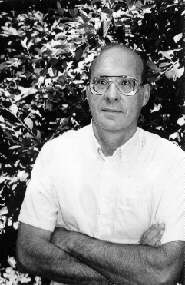Pay a return visit to the works of poet Robert Frost
August 31, 1997
Elisabeth Sherwin -- gizmo@
dcn.davis.ca.us
"Robert Frost used to get very little respect from academics," said English Professor Peter Hays of UC Davis. Hays should know. He is beginning his 32nd year as an academic.
"Academics felt that if everyone could read Frost then they were out of work," Hays added. Happily, academics today seem to take pleasure in the fact that "everyone can read Frost" and that there's quite a bit there for academics to look at, too.
So let's take a brief second look at this patrician New England poet.
Robert E. Lee Frost was born March 26, 1874, in San Francisco.
Just these bare facts tell us a lot about Frost. First of all, he was born on the West Coast - The City - not a Vermont farm or a small New Hampshire town. And look at that name: "Robert E. Lee" Frost. His father was a Copperhead, a Northern sympathizer with the South during the Civil War.
But his father died when Frost was 11 and the family had to move back to the Boston area. He graduated from Lawrence (Mass.) High School in 1892 as class poet and co-valedictorian with the young woman who was to become his wife, Elinor White.
Two years later he published his first poem and received payment of $15.
Over the next eight years, however, he published only 13 more poems.
He attended Dartmouth but dropped out to help his mother who was having financial problems running a small private school. He married Elinor in 1895. Then he entered Harvard but only stayed for two years, dropping out in 1899.
He took up poultry farming to support his growing family, for by this time he had two children. He was to have a total of six children with Elinor but tragedy visited them in the form of early deaths, insanity or suicide.
Frost was concerned about his own mental health and became interested in the works of Henry James when he was at Harvard. Frost also studied Latin and read Latin poetry throughout his life.
Frost's grandfather then bought him a farm in New Hampshire and the family moved there.
"Frost had hay fever and was a bad farmer - he frequently slept until noon," said Hays. Frost augmented his career as a farmer with teaching but, disgusted with his lack of success as a poet, he sold the farm and took his family to England in 1912.
"It was there that he was able to get his first book of poetry published," said Hays. "A Boy's Will" came first, then "North of Boston" was published in England. These works met with critical success. When he returned to the United States in 1915, he was a literary figure.
He bought a new farm in New Hampshire and began teaching again - this time at Dartmouth. In 1920 he became poet-in-residence at University of Michigan. Elinor died in 1938.
Frost's poems in later years reflect a falling off in quality, but he was honored and held in great regard. He read "The Gift Outright" at John F. Kennedy's presidential inauguration in 1961 and it is this mental picture of an old man with white hair that many people remember. Frost died in 1963.
"Frost was very concerned about reaching the general populace," said Hays. This explains in part the surface simplicity of his poems in which he generally uses the language of common speech. But just because his poems are "simple" doesn't mean they aren't misunderstood, Hays said. He suggests that "The Road Not Taken," which is usually presumed to mean "follow your heart,'' may be slightly darker: You make your choices in life and you have to live with them.
On the other hand, the poem "Mending Wall," in which Frost repeats the line "good fences make good neighbors" may not be the anti-neighbor rant it is frequently taken to be but instead celebrates the fact that Frost is meeting his neighbor to jointly inspect a stone wall that borders both properties.
"There's a constant tension in Frost poetry," Hays said, "between speaking it and understanding it."
Hays saved his highest praise for the poem "Stopping by Woods on a Snowy Evening." "For me, this is a perfect poem," he said. "He does in structure what he does in content."
Don't think that these simple poems were the result of an effortless creation. Just for fun, Hays suggested, pick up your pen this evening and try to write a 16-line poem with eight syllables per line (instead of the standard 10 syllables per line) using only four rhyming sounds. Use normal syntax and don't let it sound choppy.
Frost succeeded at his self- appointed task, said Hays, creating a perfectly lyrical, lovely sounding poem with beauty and meaning that keeps its obligation to the reader as the person in the poem keeps his obligation, too. (He stops to gaze at the stars but continues on his errand.)
Revisit the poems of Robert Frost and you may make some interesting discoveries, too.
 UCDavis English Professor
UCDavis English Professor
Peter Hays
is a
published authority on
the works of Robert Frost.
Elisabeth Sherwin interviews Peter Hays in
"Pay a return visit to the works of poet Robert Frost,"
the August 31, 1997 Printed Matter column.
Photo -- Courtesy
|
[Author Menu] [Date Menu] [Genre Menu] [Printed Matter Home]
The Davis Virtual Market
 UCDavis English Professor
UCDavis English Professor